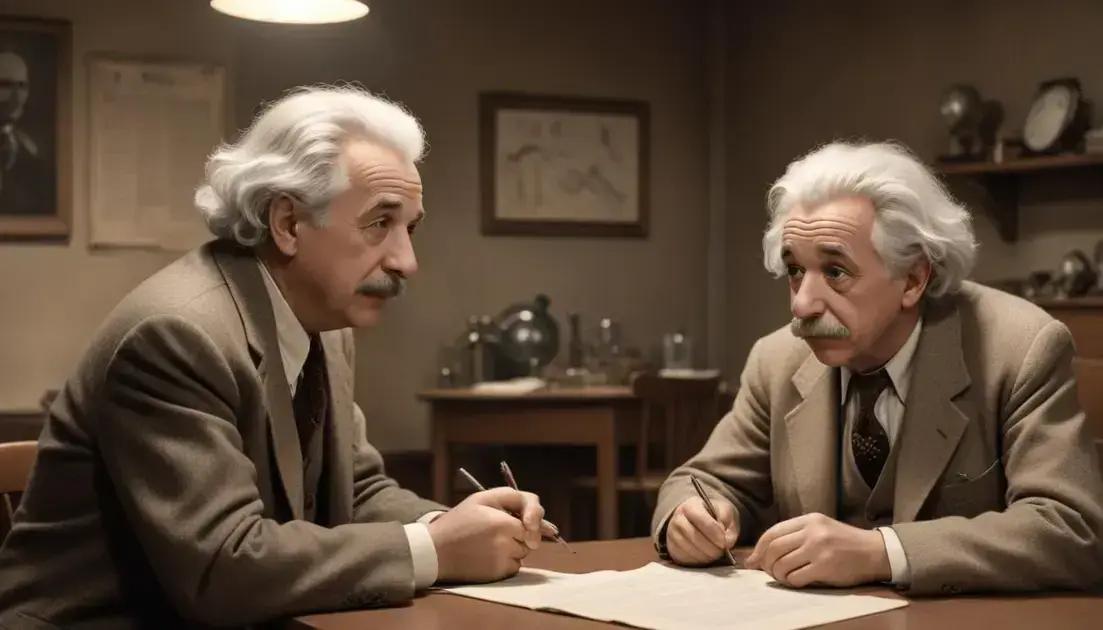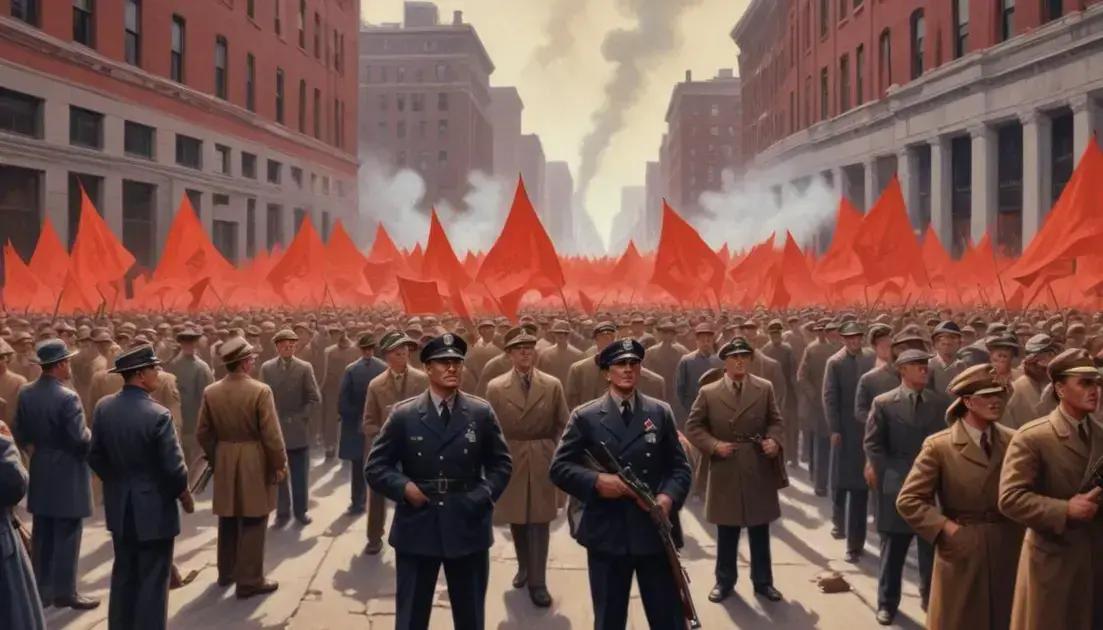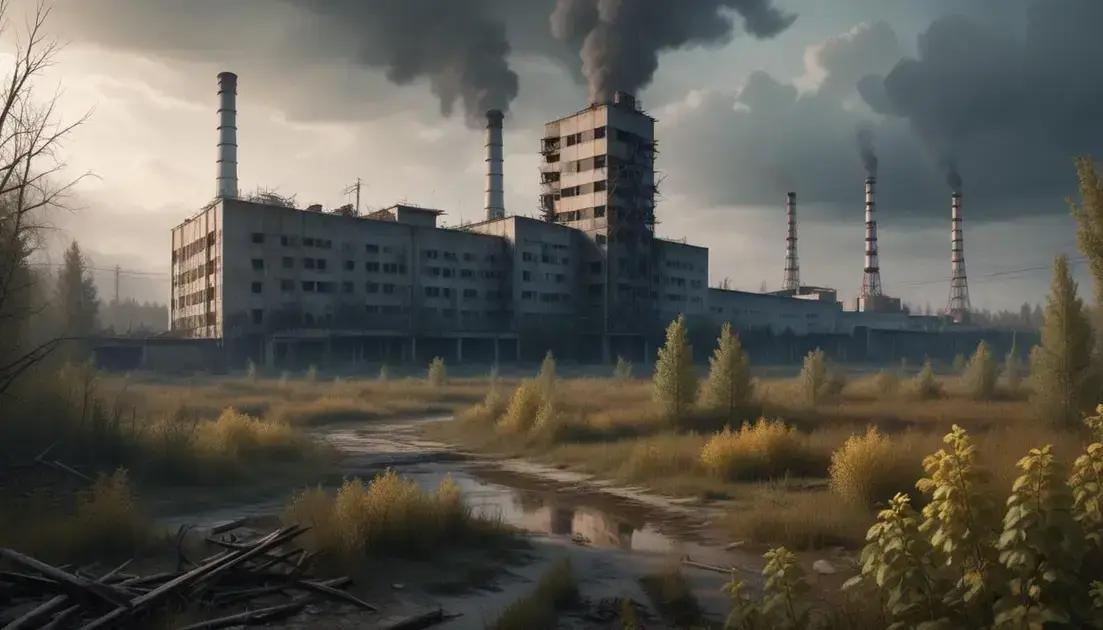
The Letter that Started the Manhattan Project and the Atomic Era
The development of the atomic bomb transformed global history, creating lasting impacts on warfare, international relations, and scientific research. It marked the dawn of nuclear weapons as a critical aspect of military strategy, influencing the Cold War and prompting ethical discussions about their use. The bomb affected the environment and public health, while also sparking advancements in nuclear energy and technology. The legacy of these events continues to shape discussions on peace and disarmament in today’s world.
Manhattan Project – a simple letter that ignited a nuclear era! Curious about how a plea for action changed the course of history? Let’s explore this pivotal moment together.
Introduction to Leo Szilard’s letter
In 1939, Leo Szilard, a brilliant physicist, had a worry. He feared that Nazi Germany was working on an atomic bomb. To prevent this, he took action. Szilard wrote a letter to President Franklin D. Roosevelt. It was not just any letter; it carried a heavy message. This letter urged the president to start research on nuclear chain reactions. Szilard believed that the U.S. needed to be ahead in this race. He knew the stakes were high, and the world could change forever if the atomic bomb fell into the wrong hands.
Einstein’s Role was crucial. Szilard asked the famous scientist to sign the letter, lending it credibility. Einstein, known for his work in physics, agreed. His name added weight to the message. This partnership was vital in getting the attention of the U.S. government. After all, a letter from Einstein could not be ignored.
When the letter reached Roosevelt, it sparked interest and concern. The president understood the potential danger. He established a committee to investigate nuclear energy and its military applications. This letter set the wheels in motion for what would become the Manhattan Project. Szilard’s quick thinking and bold action were the first steps in creating a whole new chapter in history.
The impact of the letter on the Manhattan Project
The letter from Leo Szilard had a massive impact. It changed the way the U.S. viewed nuclear research. Before this note, many didn’t see the threat. Afterward, the government realized the danger posed by Nazi Germany. Szilard’s urgent plea made leaders sit up and take notice. They understood they were in a race against time.
Formation of the Manhattan Project was a direct result. The letter led to discussions about developing atomic weapons. Soon after, the U.S. set up a team of scientists to work on this project. They focused on harnessing nuclear energy for military use. This team would later grow into what we know as the Manhattan Project.
Funding and resources poured in. The government was willing to invest heavily. This decision was crucial. With the right resources, scientists could experiment and innovate. They needed to develop technology that could lead to atomic bombs. The urgency colored every step they took.
This letter also created a sense of collaboration. Brilliant minds like J. Robert Oppenheimer and Enrico Fermi joined the effort. Szilard’s letter not only inspired action but also brought together some of the best scientific talents of the time. This collaboration was essential for getting the project rolling.
The consequences were far-reaching. What started as a letter transformed into a massive undertaking. The Manhattan Project would eventually result in the atomic bomb, forever altering global politics and warfare.
Albert Einstein’s role
Albert Einstein played a vital role in the story of the Manhattan Project. He wasn’t just a famous physicist; his influence was key. When Leo Szilard wrote the letter to President Roosevelt, he knew Einstein’s signature would grab attention. Einstein’s reputation as a brilliant scientist was unmatched.
Einstein’s agreement to sign the letter was critical. It showed the urgency of the situation. By adding his name, he helped ensure that the government would take the warning seriously. The letter urged the U.S. to start nuclear research before Nazi Germany could develop an atomic bomb.
After the letter was sent, Einstein continued to support the cause. He felt responsible for the potential consequences. The idea of nuclear weapons scared him, but he believed action was necessary. Einstein’s support encouraged the U.S. to invest more in these scientific efforts.
Einstein was not directly involved in the project itself. He didn’t work at Los Alamos, where the bomb was developed. However, his thoughts on the ethical implications of atomic power influenced many scientists. He often spoke about the importance of using such power responsibly. His emphasis on peace and humanitarian values resonated deeply during this critical time.
Einstein’s role went beyond just signing a letter. He symbolized the hope and fears of a generation. His contribution to the Manhattan Project highlights how one individual’s actions can change the course of history. In many ways, Einstein’s legacy is woven into the fabric of the atomic age.
Consequences of the atomic bomb development
The development of the atomic bomb had huge consequences, both good and bad. First, it changed warfare forever. Nations realized that nuclear weapons could cause massive destruction in seconds. This led to a new way of thinking about military power.
The immediate impact was seen in World War II. The U.S. dropped atomic bombs on Hiroshima and Nagasaki in Japan. These bombings led to Japan’s surrender. However, the devastation is still felt today. Many lives were lost, and cities were destroyed.
After the war, the world faced a new reality. Countries began to build their own nuclear arsenals. The Cold War started because of these tensions. Both the U.S. and the Soviet Union wanted to maintain their strength through nuclear power. This arms race created an atmosphere of fear and uncertainty.
The environmental impact was significant too. Testing nuclear weapons caused damage to ecosystems. Radiation from bombs affected air, water, and soil. People living near test sites experienced serious health issues.
But it wasn’t just about destruction. The atomic bomb also changed science and technology. Governments invested heavily in research. This led to advancements in nuclear energy, medicine, and various technologies. However, it also raised ethical questions. Scientists debated the moral implications of their work. The question lingered: was it right to create such weapons?
Overall, the atomic bomb’s development changed the course of history. It created a lasting legacy that continues to influence politics, ethics, and science today.
Legacy and historical significance
The legacy of the atomic bomb is profound and complex. It shaped global politics and society in many ways. One major aspect is the ongoing debate about nuclear weapons. Countries now view these weapons as a key part of their military strategy. This has created a tense environment between nations.
The historical significance goes beyond just war. The atomic bomb revolutionized scientific research. It opened doors to nuclear energy, which provides a significant source of power today. Scientists studied the reactions and learned more about atomic structure, fueling advancements in physics and engineering.
Another important impact is on international relations. The Cold War was driven by nuclear arms competition. Nations worked to develop and stockpile nuclear weapons. This created a balance of power that still affects global politics today.
The bomb also raised ethical questions. People continue to discuss the morality of using such destructive force. The consequences of Hiroshima and Nagasaki remain a sobering reminder of this power. These discussions influence how countries approach war, peace, and disarmament now.
Moreover, the legacy extends into culture. Movies, books, and art reflect fears and hopes related to nuclear power. Stories about the atomic bomb have inspired countless works, showing its impact on our collective imagination. This influence is a testament to how deeply the bomb affected society.
Conclusion
In conclusion, the impact of the atomic bomb and the events surrounding its development are significant. The legacy of the bomb reshaped global politics, influenced scientific research, and sparked serious ethical discussions. It serves as a powerful reminder of the responsibilities that come with great technological advancements.
As we reflect on this pivotal moment in history, we must consider how it continues to affect us today. The balance of power through nuclear weapons still shapes international relations. Moreover, the conversations around peace and disarmament are more relevant than ever. Understanding this legacy helps us navigate the challenges we face in our world now.
Ultimately, the lessons learned from the atomic bomb guide our approach to science, ethics, and diplomacy. By remembering the past, we can strive to create a safer, more peaceful future for everyone.


